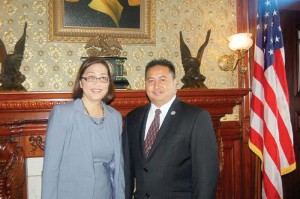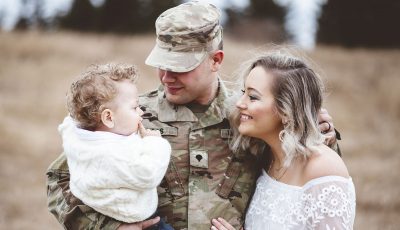902 report now with Congress

U.S. Special Representative Esther Kia’aina and Commonwealth of the Northern Mariana Islands Special Representative Gov. Ralph DLG Torres at the White House Eisenhower Executive Office Building, Washington, D.C., at the first 902 Consultations meeting, June 6, 2016. (Contributed Photo)
It is now up leaders of U.S. Congress to act on the CNMI’s concerns that were discussed in the six-part 902 talks after both panels—the federal and CNMI government’s sides—transmitted their final report to congressional leaders yesterday. The report’s recommendations focused on immigration and labor issues, and the U.S. military’s proposed activities in the CNMI.
Island officials are hoping that a GOP-dominated Congress would act favorably on their concerns, especially after the Republicans regained the White House with the election of businessman and reality show host-turned-politician Donald J. Trump to the presidency.
Both panels agreed to address the current labor and immigration issue concerning the CNMI-Only Transitional Worker Visa program, which expires in two years. The issue needs immediate action as workers are in great demand, with the CNMI economy showing great improvement after years of negative development.
Some of the issues that both panels agreed to recommend for immediate action are:
-extending the CW1 program beyond 2019;
-raising the CW1 numerical limit of foreign workers allowed in the CNMI to 18,000;
-considering the use of immigration policies to address labor shortages in the CNMI and Guam; and
-extending the eligibility of the federal workforce development program in the CNMI;
Providing permanent immigration status for long-term guest workers could be the most contentious among the eight recommendations made by both panels on the 902 report.
A lot of foreign workers, many of whom have spent most of their lives in the Commonwealth, have been pushing for an improved immigration status, even if it is CNMI-only residency.
Local officials have recommended an improved status for guest workers that have been here for more than 10 years. If granted, that would free these workers from the CW1 program, thus giving their slots to incoming personnel that would be under the transitional visa workforce.
Military activities
Both panels agreed to the creation of a CNMI-Department of Defense Coordinating Council to improve the communication and relationship between the local government and the Department of Defense.
Furthermore, the council would address the issues the CNMI raised during meetings with DoD officials on required environmental analysis processes, giving territorial leaders an avenue to engage in direct communication bridging agreements and resolving issues.
Inconsistencies between the CNMI Joint Military Training and the Commonwealth Covenant, and the technical and 1983 lease agreements; the CJMT’s potential impact on the CNMI’s economy; ensuring the CNMI’s participation in decision making; and appropriate compensation for military activity on Farallon de Medinilla were the issues the CNMI panel focused on.
Both panels also reviewed the history of military activities in the CNMI, the original plans for Tinian, and other DoD projects including the military’s relocation, training, and testing projects in Guam and the CNMI; the United States Air Force’s divert plans; and CJMT.
Reactions
U.S. Special Representative Esther Kia’aina, who would step down as Assistant Secretary for Insular Areas when the Trump administration takes over, said she was honored to represent the U.S. federal government and lead the meetings on Washington’s side. She also lauded the final outcome of the 902 talks.
“This joint report reflects the strength of the U.S.-CNMI relationship and will provide federal policymakers in the Executive Branch and Congress with a roadmap on how to best address important issues that have a tremendous impact on the economy and overall wellbeing of the CNMI people,” said Kia’aina in a statement.
Torres, who represented the CNMI side, also commended Kia’aina’s effort. “It was truly an honor to work alongside my federal government counterpart in this significant endeavor for the people of the CNMI. I thank President Barack Obama for allowing the CNMI an opportunity to voice our concerns and have those concerns be incorporated into the report’s final recommendations.”
“This is an important and historic event in our relationship with the federal government and is one that will continue to provide for greater understanding of the critical issues facing the CNMI going forward,” said Torres.
He said he pushed hard in order that the concerns on the CNMI’s labor and immigration issues, and the U.S. military’s presence in the Commonwealth, would be discussed in the 902 talks.
“Addressing the economic and workforce development interests of the CNMI, and working toward policies that treat our islands in a fair and equitable manner will require federal executive and/or legislative action before the expiration of the CW1 program on Dec. 31, 2019, in order to ensure the CNMI’s economic stability,” Torres said.
“Likewise, additional work will be needed to define a military presence in the CNMI that reflects the Commonwealth’s commitment to a strong national defense but also respects our economic needs, our fragile ecosystem and our way of life.”
He said CNMI officials are now hoping leaders of Congress would consider the 902 report for possible action. “We are now able to present to the federal government a clearer picture of our positions regarding the proposed military projects on our islands as well as the current issues surrounding the CW program and our workforce to ensure the CNMI’s best interests are known and reflected,” he said.
Delegate Gregorio Kilili C. Sablan (Ind-MP) congratulated Torres and Kia’aina for the transmittal and the release of the 902 report.
“The recommendations they have made and the policy justifications the report puts forward will certainly be an important addition to the discussions that we are having here in Congress regarding immigration and labor issues in the Marianas,” said Sablan.
CNMI Rep. Angel A. Demapan (R-Saipan), who was also part of the CNMI team in the 902 talks as then-chair of the House Federal and Foreign Affairs Committee in the 19th Legislature, he was also honored to be part of the meetings that has a significant impact on the Commonwealth.
“I’m grateful that this effort has provided us a real opportunity to speak for our people to the highest levels of the federal government and be heard. The issues raised during the many hours we spent in consultation are incredibly significant both in the economy and livelihood of all CNMI residents.”
“It is certainly our hope that U.S. Congress would take the time to review the report and consider the concerns and recommendations raised. The challenges we face as an island community often get overshadowed by the policies of mainland U.S. We hope that through the 902 report, the needs of our Commonwealth would be greater amplified and addressed in Washington, D.C.”
Panel members
Kia’aina was appointed as the federal government’s special representative to the 902 talks, with Torres leading the CNMI side.
DHS Assistant Secretary for Border, Immigration, and Trade Policy Seth Stodder, and Deputy Assistant Secretary Mary Giovagnoli; and Deputy Assistant Secretary of Defense for Energy, Installations, and Environment Peter Potochney were also part of the U.S. team while secretaries Edith deleon Guerrero (Labor) and Marianne Teregeyo (Public Lands) were also principal members of the CNMI panel.
Nikolao Pula (Office of Insular Affairs U.S. Department of the Interior director), Wendy Clerinx (Assistant Secretary for Insular Areas DOI advisor), Timothy Murphy (Office of the Solicitor DOI assistant solicitor), Philip Busch (Office of the Chief Counsel, U.S. Citizenship and Immigration Services-DHS legislative counsel), Kevin Cummings (USCIS-DHS Business & Foreign Workers Office of Policy and Strategy chief), David Gulick (USCIS-DHS Honolulu District director), Steven Iselin (DoD Principal Deputy Assistant Secretary of the Navy for Energy, Installations, and Environment), Richard Hartley (DoD Principal Deputy Assistant Secretary of USAF for Installations, Environment, and Energy), Katherine Gayle von Eckartsberg (DoD Pacific Division Plans, Policy, and Operations U.S. Marine Corps director), Ginger Rice (DoD Basing Office of the Assistant Secretary of Defense for Energy, Installations and Environment assistant director), and Jennifer Mustain (Dod) Deputy Assistant Secretary of the Navy for Installations, Facilities, and Basing) were the other members of the federal panel.
Then-Senate vice president Arnold I. Palacios (R-Saipan), mayors Joey San Nicolas (Tinian) and Efraim Atalig (Rota), governor’s chief of staff Matthew Deleon Guerrero, governor’s legal counsel Wesley Bogdan, CNMI outside counsel Matthew Adams, Saipan Chamber of Commerce’s Alex Sablan, and University of California law professor Rose Cuison Villazor also represented the CNMI.
Part of US-CNMI Covenant
The talks sprang from Section 902 of the Covenant that established the CNMI’s political union with the U.S. federal government. The 902 talks started on June 6 last year at the White House and included a series of meetings in Hawaii and the CNMI that included site visits on Saipan, Tinian, and Pagan in the following months.
The site visits were made to give the federal group firsthand information and the chance to assess the situation on issues that the CNMI panel was pushing for. Businesses and construction sites that were affected by the limited number of foreign workers under the CW1 program, areas where planned military activities will be held, and a historic visit on Pagan were part of the trip.
Special representatives saw the current situation of the CNMI workforce issues as well as the economic challenges faced by the local government, private sector, and its people.
This is the first known report, which is the culmination of almost one year of consultations and meetings, that reached the President and was transmitted to Congress



























